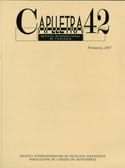Aportació a l'estudi de la conjunció concessiva «jatsia»
DOI:
https://doi.org/10.7203/caplletra.42.4819Keywords:
ancient Catalan, syntax, complex sentence, subordination, concessive sentence, concessive conjunctive locution, concessive conjunction, concessive connector, grammaticalization, aspectual temporary adverb, regulations. Abstract
Abstract
Concessive connectors are the focal point of grammaticalization processes, based on several types of lexical sources. In Catalan, «jatsia» (that) is the result of a
grammaticalization process based on an aspectual temporary adverb (or phase adverb), which is comparable to the process that produced «encara que». The case of «encara que» has already been studied specifically by Pérez Saldanya & Salvador (1995), while Klesper (1930), Badia (1982) and Cuenca & Massip (2005) have focused on «jatsia» (that). The interest of the study of these processes is increased in the case of «jatsia»(that) by the polymorphism it shows and by the displacement it has experimented in its use, since it has gone from being of general use in the expression of concessivity to be practically out of use. This is especially due to the fact that this displacement is not restrictive to Catalan but common to other Romance languages,and because it can correlate directly with the generalization of encara que and the
appearance of the causal ja que (or later «ja...ja...» in its distributive use). And also, because of the incidence that it had in the precepts of the period and in contemporary
normative coding.
 Downloads
Downloads
Downloads
Published
How to Cite
-
Abstract680
-
PDF (Català)175
Issue
Section
License
Authors submitting work to Caplletra for publication must be the legitimate holder of the usage rights. Legitimacy for the purposes of publishing the work must also include images, tables, diagrams and any other materials that may complement the text, whether they are the author of such material or not.
Copyright: on publishing their work in the journal, the author grants Caplletra. Revista Internacional de Filologia usage rights (reproduction, distribution and public communication) for both the paper printed version and for the electronic version.
All work published in Caplletra is covered by the Creative Commons license type Attribution-NonCommercial-NoDerivatives 4.0 (CC BY-NC-ND 4.0).
RESPONSABILITY
Caplletra. Revista Internacional de Filologia does not necessarily identify with the points of view expressed in the papers it publishes.
Caplletra. Revista Internacional de Filologia accepts no responsibility whatsoever for any eventual infringement of intellectual property rights on the part of authors.






